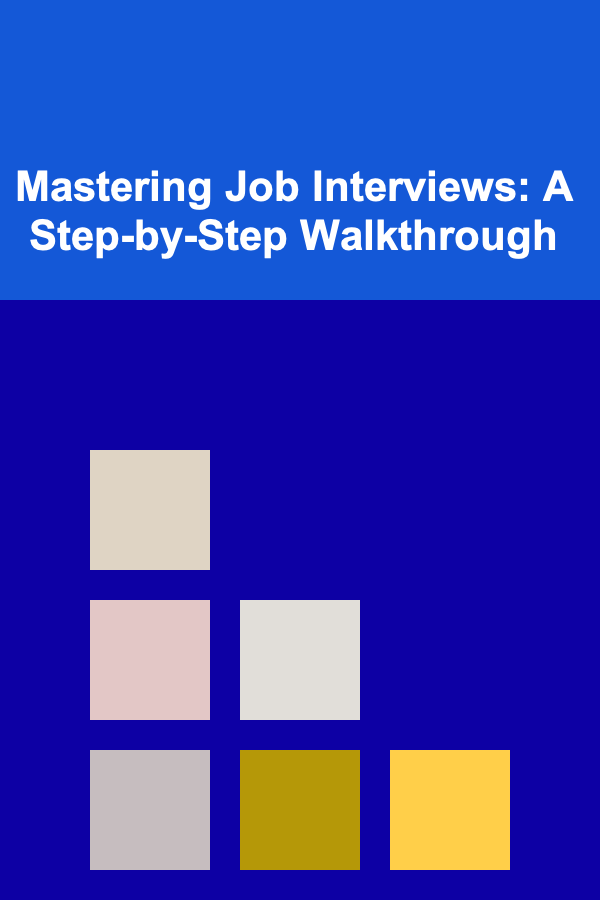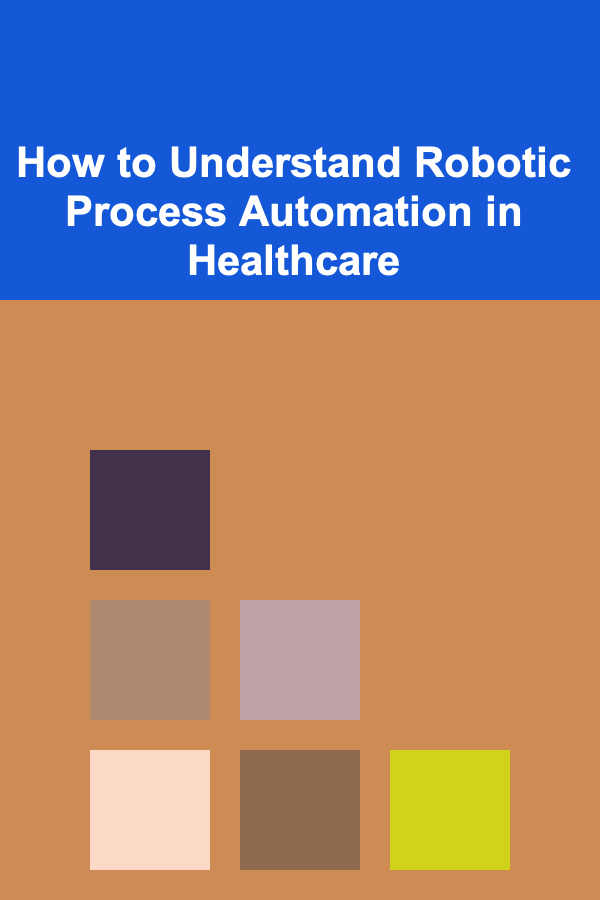
Mastering Job Interviews: A Step-by-Step Walkthrough
ebook include PDF & Audio bundle (Micro Guide)
$12.99$8.99
Limited Time Offer! Order within the next:

Job interviews are a critical component of the hiring process. Whether you're seeking your first job, transitioning to a new career, or trying to advance in your current profession, excelling in interviews is a crucial skill. A successful interview not only opens doors to job offers but also provides an opportunity to demonstrate your professional abilities, personality, and cultural fit within a company.
This article provides a comprehensive guide on how to master job interviews through a systematic, step-by-step approach. From preparing in advance to effectively managing interview anxiety and closing with a strong follow-up, we'll walk through every phase of the interview process to ensure you stand out as a top candidate.
Preparing for the Interview
Preparation is the foundation of any successful interview. Being well-prepared ensures that you can answer questions confidently, demonstrate your qualifications, and ask insightful questions. Preparation should begin well before the interview day, with several key steps to follow.
Research the Company
The first step in preparing for an interview is to thoroughly research the company. Understanding the organization's values, mission, culture, and recent news will allow you to tailor your answers and demonstrate your genuine interest in the position.
Start by exploring the company's website, focusing on their About Us page, products or services, and any news updates. Use LinkedIn to see who works at the company and understand the team structure. It's also helpful to read recent articles or press releases about the company to stay informed on any developments or challenges they may be facing.
Review the Job Description
Understanding the job requirements is equally important. The job description provides a roadmap of what the employer is seeking in a candidate, including specific skills, experience, and responsibilities. Be sure to match your qualifications to the key requirements outlined in the job posting. Take note of any keywords or phrases used, as these may be mentioned during the interview.
Prepare Your Responses
While you can't anticipate every question, you can prepare for common interview topics. Some of the most common questions include:
- Tell me about yourself.
- Why do you want to work here?
- What are your strengths and weaknesses?
- Describe a challenging situation you've faced and how you handled it.
- Why should we hire you?
For each question, formulate concise yet compelling answers that highlight your skills, experience, and enthusiasm for the role. Practice these responses aloud to ensure that they sound natural and confident.
Prepare Questions for the Interviewer
At the end of most interviews, you'll be asked if you have any questions. This is your opportunity to demonstrate your interest in the role and learn more about the company. Prepare a list of thoughtful questions, such as:
- How would you describe the company culture?
- What does success look like in this role?
- What are the opportunities for professional growth and development?
- Can you tell me more about the team I would be working with?
These questions not only show that you're engaged, but they also help you evaluate whether the job and company are the right fit for you.
Mastering Nonverbal Communication
Nonverbal communication plays a significant role in the interview process. Your body language, eye contact, and tone of voice all contribute to the impression you make on the interviewer.
Body Language
From the moment you enter the room, your body language should convey confidence and professionalism. Maintain good posture, keep your arms relaxed at your sides or on the table, and avoid crossing your arms, as this can make you appear defensive. A firm handshake, when appropriate, is also important to establish a positive first impression.
Eye Contact
Make regular eye contact with the interviewer throughout the conversation. This shows confidence, engagement, and honesty. However, be mindful not to stare intensely, as this can make the interaction uncomfortable. Instead, aim to maintain a balanced level of eye contact, looking at the interviewer when they speak and shifting your gaze occasionally.
Facial Expressions
Your facial expressions should reflect your emotions and responses. Smile when appropriate, as this can make you appear friendly and approachable. Avoid looking overly serious or disinterested, as it can give the impression that you're not engaged or excited about the opportunity.
Tone of Voice
The tone of your voice can convey a lot about your confidence and enthusiasm. Speak clearly and with a steady tone. Avoid speaking too fast, as this may make you sound nervous or unprepared. At the same time, ensure that your voice reflects enthusiasm for the position, as employers want to hire candidates who are excited about the job.
Handling Common Interview Questions
Interviews often follow a predictable pattern, with several key questions that assess your qualifications, experience, and motivation. Below are strategies for answering some of the most common questions effectively.
Tell Me About Yourself
This question is often used as an icebreaker, but it's an opportunity for you to set the tone of the interview. Keep your answer concise and focus on aspects of your background that are relevant to the job.
- Structure your response: Begin with a brief overview of your professional background, followed by a discussion of your key skills and achievements. Finish by explaining why you're excited about this opportunity.
- Keep it relevant: Tailor your answer to align with the job description, focusing on experiences that demonstrate your ability to succeed in the role.
Why Do You Want to Work Here?
This is your chance to show that you've done your research and understand the company. Avoid generic answers like "I need a job" or "I'm looking for a challenge." Instead, focus on why the company's values, mission, or growth opportunities align with your personal goals and career aspirations.
- Be specific: Mention aspects of the company or role that excite you, whether it's the company's culture, the team dynamics, or the opportunity for professional development.
- Link your values: Explain how the company's mission aligns with your personal values and why you believe you would thrive in that environment.
What Are Your Strengths and Weaknesses?
When discussing strengths, focus on qualities that are directly relevant to the job. Provide concrete examples of how these strengths have helped you succeed in the past.
For weaknesses, choose something that won't disqualify you for the position. Be honest about a challenge you've faced, but emphasize what you've done to improve. Employers appreciate candidates who are self-aware and committed to personal growth.
Describe a Challenging Situation and How You Handled It
This question assesses your problem-solving abilities and resilience. Use the STAR method to structure your answer:
- Situation: Briefly describe the context or challenge.
- Task: Explain the goal or task you had to accomplish.
- Action: Discuss the steps you took to address the challenge.
- Result: Share the outcome of your actions and what you learned.
Why Should We Hire You?
This is your opportunity to summarize your key strengths and explain why you're the best candidate for the job. Focus on how your skills and experiences align with the job requirements and how you can contribute to the company's success.
- Highlight your unique selling points: Emphasize what sets you apart from other candidates.
- Link your experience to the job: Clearly demonstrate how your background makes you a strong fit for the position.
Managing Interview Anxiety
It's completely normal to feel nervous before a job interview. However, it's essential to manage that anxiety to perform at your best.
Practice Relaxation Techniques
Breathing exercises, meditation, or mindfulness techniques can help calm your nerves before the interview. Practice deep breathing or visualize yourself succeeding in the interview to reduce anxiety and boost your confidence.
Positive Visualization
Imagine yourself walking into the interview room with confidence, answering questions smoothly, and leaving the interview feeling proud of your performance. Visualization can help reduce stress and improve your mindset before the interview.
Prepare for the Worst-Case Scenario
One way to alleviate interview anxiety is to mentally prepare for potential challenges. Consider worst-case scenarios, such as not knowing the answer to a question or experiencing technical difficulties. By preparing for these situations, you'll be less likely to panic if they arise.
Following Up After the Interview
The interview doesn't end when you walk out of the room. Following up with a thank-you note is an essential step in the process. It demonstrates professionalism, reinforces your interest in the position, and provides an opportunity to highlight key points you may have missed during the interview.
Send a Thank-You Email
Within 24 hours of the interview, send a personalized thank-you email to each interviewer. Thank them for their time and reiterate your enthusiasm for the role. If there was a point in the interview that you didn't fully address, this is your chance to briefly clarify or expand on it.
- Express appreciation: Start by thanking the interviewer for their time and consideration.
- Reaffirm interest: Mention a specific aspect of the interview that excites you about the role and the company.
- Be concise: Keep the email brief, polite, and professional.
Stay Patient
After sending the thank-you note, be patient while the employer completes their decision-making process. It's acceptable to follow up after a week or two if you haven't heard back, but avoid being overly persistent or pushy.
Conclusion
Mastering job interviews is a skill that requires preparation, practice, and confidence. By thoroughly researching the company, preparing your responses, and mastering nonverbal communication, you can set yourself up for success. Moreover, handling common interview questions with care, managing anxiety, and following up effectively will increase your chances of landing your desired job. By incorporating these strategies into your job interview approach, you'll be well on your way to securing the career opportunity you've been striving for.

How to Handle Security Deposits for Your Rental Property
Read More
How to Manage Craft Supplies for Small Spaces
Read More
How to Use Shelf Risers for Maximizing Space
Read More
How to Understand Robotic Process Automation in Healthcare
Read More
How to Build a Living Roof
Read More
10 Tips for Learning a Dying Language
Read MoreOther Products

How to Handle Security Deposits for Your Rental Property
Read More
How to Manage Craft Supplies for Small Spaces
Read More
How to Use Shelf Risers for Maximizing Space
Read More
How to Understand Robotic Process Automation in Healthcare
Read More
How to Build a Living Roof
Read More